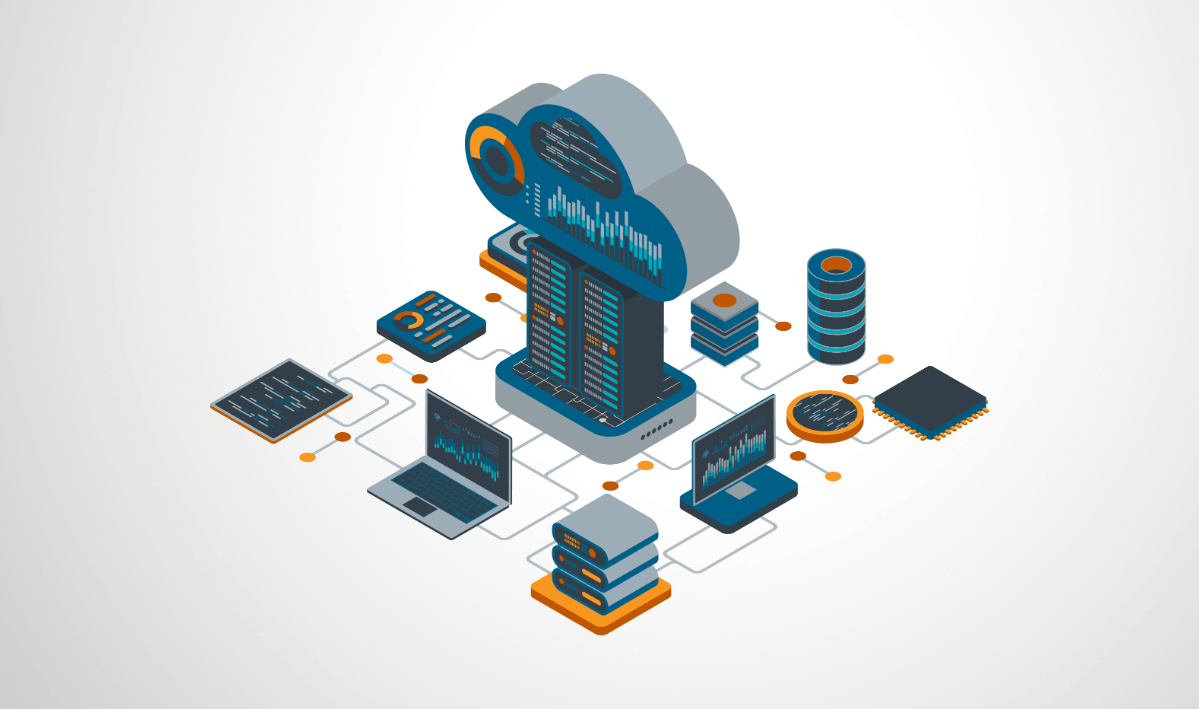
SUMMARY
Balancing the benefits of AI against the potential climate impacts remains a tangled issue. While public opinion about AI is mixed, Americans’ primary concerns revolve around issues of displaced jobs and data privacy. This study from the Center for Media Engagement is one of the first to explore public attitudes related to AI and its environmental impact.
The findings reveal Texans’ concerns about AI, their perceptions of its environmental impact, their trust in government and industry to govern it responsibly, and their preferences for different kinds of policies to help manage it:
- Texans have a positive outlook toward AI but underestimate their usage
- There is a paradoxical relationship with AI technology
- Environmental concerns related to AI data centers are significant but rank lower than other sources of pollution
- Community acceptance is mixed and partisan
- Proximity to data centers increases awareness and concern but also increases support for data center development
- Texans have low confidence in oversight but strong support for taxation
- Techno-skepticism contributes to AI opposition
BACKGROUND
As artificial intelligence becomes increasingly intertwined with everyday life, its energy demands will only grow. And while the potential benefits of AI are remarkable, its carbon footprint cannot be ignored. One ChatGPT query requires 10 times more energy than a single Google search, and 15 queries are the equivalent of streaming one hour of video content.1 That may sound modest, but with more than 1 billion queries a day on ChatGPT alone, the emissions add up.2 By 2027, global AI data centers will need twice as much power as they did in 2022.3
Balancing the benefits of AI against the potential climate impacts remains a tangled issue. While public opinion about AI is mixed, Americans’ primary concerns revolve around issues of displaced jobs and data privacy.4 Opinion polls tracking concern for its environmental and equity impacts are mostly missing, a pattern that is exacerbated by a lack of government regulation and transparency within the AI industry to disclose accurate accounting of its energy footprint.5
Our study is one of the first to explore public attitudes related to AI and its environmental impact. We surveyed 800 Texas residents to assess their concerns about AI, their perceptions of its environmental impact, their trust in government and industry to govern it responsibly, and their preferences for different kinds of policies to help manage it. Texas has one of the highest concentrations of data centers in the U.S., second to Virginia and just ahead of California.
Data centers are integral to the function of AI and provide the required computing power, storage, and infrastructure to train and deploy large language models. They operate 24/7 and house servers along with the fans and cooling equipment needed to keep the system from overheating. These facilities are a significant strain on the state’s power grid and water reserves.6
In Texas alone, data centers used nearly 22 million megawatt hours of electricity in 2023 – 4.6% of the state’s electricity consumption.7 That’s more than four times the amount of energy used to power the residential sector in the city of Austin.8 Under high growth scenarios, projections for energy consumption of data centers in Texas are expected to at least double by 2030.9
KEY TAKEAWAYS
- Texans have a positive outlook toward AI but underestimate their usage. While 85% of participants have heard about AI and more than two-thirds view AI as having a positive impact, only half recognized that they regularly interact with AI, suggesting a lack of awareness about how embedded AI is in daily activities.
- There is a paradoxical relationship with AI technology. Texans expressed general optimism about the benefits of AI while simultaneously showing distrust in the institutions managing it and not a lot of support for a data center in their community.
- Environmental concerns related to AI data centers are significant but rank lower than other sources of pollution. While nearly two-thirds of Texans are concerned about the environmental impact of data centers, data center construction ranks far below air and water pollution as an environmental priority.
- Community acceptance is mixed and partisan. Only 31% of Texans would support a data center in their community, with Republicans significantly more supportive (43%) than Democrats or Independents.
- Proximity to data centers increases awareness and concern but also increases support for data center development. Only 37% of Texans said they know they live near a data center, despite Texas having around 350 facilities. Those who are aware view data centers as more of a local concern but also have more confidence in AI management and regulation, and are more likely to support additional data centers in their community.
- Texans have low confidence in oversight but strong support for taxation. Only 27% trust government regulation of the centers and only 33% trust companies to use AI responsibly. A majority (80%) of Texans support taxing electricity used by AI data centers, with support across party lines.
- Techno-skepticism contributes to AI opposition. Texans with higher levels of techno-skepticism (distrust of new technologies and their impacts) view AI more negatively and are less supportive of data center development.
OVERVIEW OF RESULTS
AI Awareness and Use
Most Texans we spoke with (85%) have heard a lot or a great deal about AI, but only about half say they interact with it on a regular basis. Given the prevalence of AI in even basic day-to-day endeavors – by default, a simple Google search begins with an AI-generated overview – this is likely an underestimation of the frequency with which Texans actually interact with AI. It suggests Texans are not aware of how seamlessly AI has been incorporated into daily functions and the frequency with which they use it.
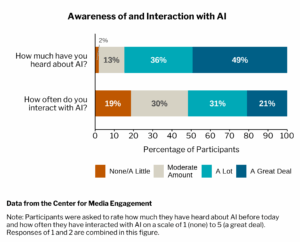
In general, Texans take a positive view of AI, with a large majority agreeing that AI will have a very positive or somewhat positive impact on society (66%) and on their own lives (70%). These views vary depending on political party affiliation, with those who identify as Republican being more likely to see the benefits of AI as outweighing the risks.
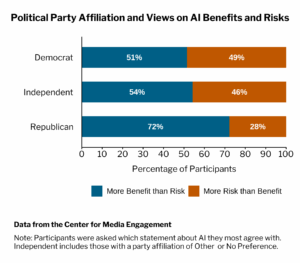
Although the state of Texas is home to 350 data centers – the second highest proportion after Virginia – only about a third of Texans (37%) say there is a data center near them. More than half (53%) are unsure about whether they live near one. Those who are aware of a data center near them are more likely to view AI as having more benefits than risks.
Environmental Impacts of AI Data Centers
Importance of Data Center Impact Compared to Other Issues
Compared to other environmental issues, the environmental impact of AI data centers ranks lowest in importance. Texans are most likely to rate air pollution as the most important environmental issue (81% rate it as very or extremely important), followed by water pollution (71%), and plastic pollution (69%). Although close to half of Texans view the environmental impact of data centers as very or extremely important (47%), this is still behind the issue of PFAS, known as forever chemicals (65%), and reliance on fossil fuels (58%).
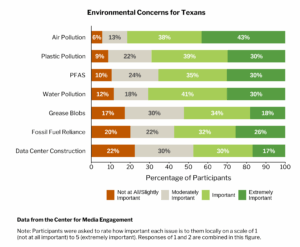
The degree to which Texans view the environmental impacts of AI data centers as important depends on proximity. Among those who say they live near a data center, 58% rated the environmental impacts as very or extremely important, compared with 41% of those who do not or are unsure whether they live near a data center.
Specific Environmental Impacts of AI Data Centers
When asked about their level of concern for the environmental impact of AI data centers, about two-thirds of Texans said they are concerned about the overall impact. When we look at this more closely in terms of specific environmental concerns, the amount of energy and the amount of water that data centers require are the two biggest concerns. A majority of Texans are moderately or very concerned about the energy data centers consume (60%), the amount of water centers consume (56%), and their impact on land use (51%). Although still sizable, concern is lower for other impacts, like increased traffic (40.5%), noise pollution (40%), and declining property values (38.5%).
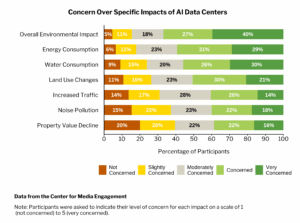
Concern about overall environmental impacts varied by gender, political party affiliation, and political ideology. Women reported significantly more concern than men about the environmental impact of data centers (72% compared to 62%). In regard to party affiliation, Republicans were more concerned about declining property values and noise pollution, whereas Democrats were more concerned about overall environmental impact as well as energy and water consumption. We observe similar results by political ideology. Liberals were more concerned about changes to land use, water, energy, and environmental impact, while Conservatives were more concerned about declining property values.
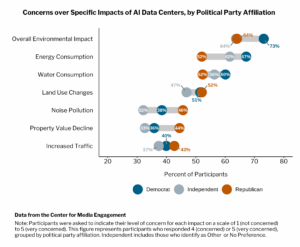
Although specific environmental concerns did not vary depending on whether someone lives near a data center or by age, concern for the overall environmental impact did. Those who live near a data center, as well as younger participants, reported greater concern.
Support for AI Regulation and Policies
Confidence in AI Regulation
When it comes to regulation and responsible use of AI, Texans view government and industry as equally unlikely to be responsible stewards of the technology. Only 33% of Texans have some or a great deal of confidence in U.S. companies using AI responsibly, while 27% have some or a great deal of confidence that the U.S. government can effectively regulate AI.
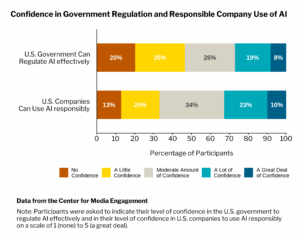
Those who are aware of a data center near them have more faith in government and industry to manage AI responsibly than those who do not live near a data center or who are not aware of a data center near them. A higher percentage of Republican participants have some or a great deal of confidence in U.S. companies and the U.S. government than Democrats or Independents/Other.
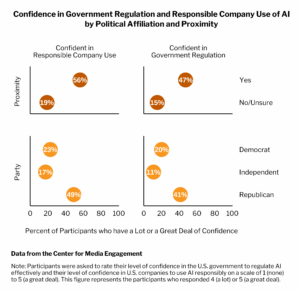
Support for AI Policies and Data Center Development
The majority of those surveyed are likely or extremely likely to support a tax on the electricity used by AI data centers (80%). While there is a slight partisan difference, Republicans, Democrats, and Independents (including Other & No Preference) lean likely to support.
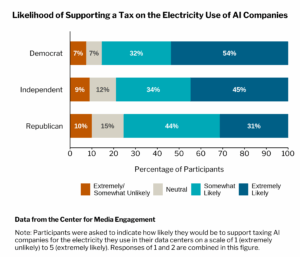
While 44% reported that the economic benefits of a data center would outweigh resource and environmental concerns, only 31% reported that they would vote yes to having a data center in their community (compared to 41% who would not vote yes and 28% who were neutral). Republicans are more likely to support a data center in their community (43% say yes or definitely yes) compared to Democrats (22%) or Independents (22%, including Other or No Preference).
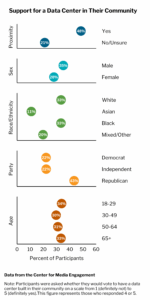
Techno-Skepticism
Techno-skepticism is characterized by distrust of new technologies and their impacts. It encompasses concerns that technological development prioritizes profits over human benefit, anxiety about technology’s trajectory, belief that technology is dangerous and unmanageable, and personal discomfort with emerging technological innovations.
Participants who have a higher level of techno-skepticism are less supportive of AI data centers overall. The more skeptical someone is about new technologies, the more concerned they are about the environmental impact of AI data centers, as well as the energy and water consumption and associated land use changes.
Similarly, participants with a high level of skepticism have a more negative view of the impact of AI on society and themselves compared to those with a low or moderate level. Lastly, those who are more techno-skeptical are less likely to want a data center in their area, with 48% of those who have low skepticism in support compared to 18% of those with high skepticism.
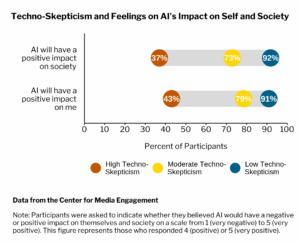
METHODOLOGY
Participants (N = 800) were recruited via Prolific. The table below provides socio-demographic information. The majority of participants identified as white, and our sample included slightly more participants who identified as female than male. Our sample also consisted of a higher percentage of Republicans. The majority of participants were located in the Prairies and Lakes (26.8%), Gulf Coast (24.2%), and South Texas Plains (20.1%) regions, followed by Hill Country (14.1%), Piney Woods (7.2%), Panhandle Plains (4.8%), and Big Bend Country (2.8%).
Each question was asked as a 5-point Likert-style scale (e.g., strongly agree to strongly disagree) except for political ideology, which was measured on a 7-point scale (1=very liberal, 7=very conservative), or as a categorical response (e.g., Republican, Democrat, Independent, or Other).
Funding for data collection was provided by the Stan Richards School for Advertising and PR in the Moody College of Communication.
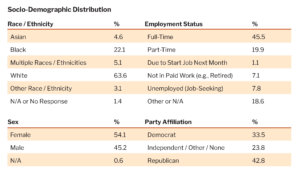
Suggested Citation:
Atkinson, L. and Miniard, D. (July, 2025). Power struggles: Texans’ thoughts on the AI data center boom and its environmental impacts. Center for Media Engagement. https://mediaengagement.org/research/texas-ai-data-center-boom
- Sachs G. AI is poised to drive 160% increase in data center power demand. Goldman Sachs Insights 2024; Wong V. Gen AI’s environmental ledger: A closer look at the carbon footprint of ChatGPT. Picktochart 2024.[↩]
- Singh S. Number Of ChatGPT Users (February 2025). DemandSage 2025.[↩]
- Pilz K, Mahmood Y, Heim L. AI’s Power Requirements Under Exponential Growth: Extrapolating AI Data Center Power Demand and Assessing Its Potential Impact on U.S. Competitiveness. RAND 2025.[↩]
- Colson D. New Poll Reveals Overwhelming Support To Rein in AI’s Use of Public Data, Shows Concern Over AI Job Displacement and Energy Consumption [Press Release]. Artif Intell Policy Inst 2024.[↩]
- Eddy N. AI Data Centers Pose Regulatory Challenge, Jeopardizing Climate Goals – Study. DataCenter Knowl 2024; Wong W. Data Center Regulation Trends to Watch in 2025. DataCenter Knowl 2024.[↩]
- Aton A. States’ emerging climate dilemma: Data centers. EE News Polit 2024; Shehabi A, Smith SJ, Masanet E et al. Data center growth in the United States: decoupling the demand for services from electricity use. Environ Res Lett 2018;13:124030.[↩]
- EPRI. Powering Intelligence: Analyzing Artificial Intelligence and Data Center Energy Consumption. Electric Power Research Institute, 2024.[↩]
- Austin Energy. Austin Energy By the Numbers. 2024.[↩]
- EPRI. Powering Intelligence: Analyzing Artificial Intelligence and Data Center Energy Consumption. Electric Power Research Institute, 2024.[↩]



